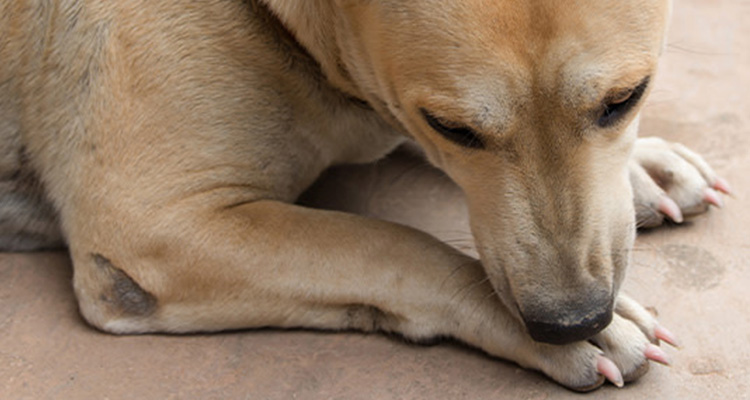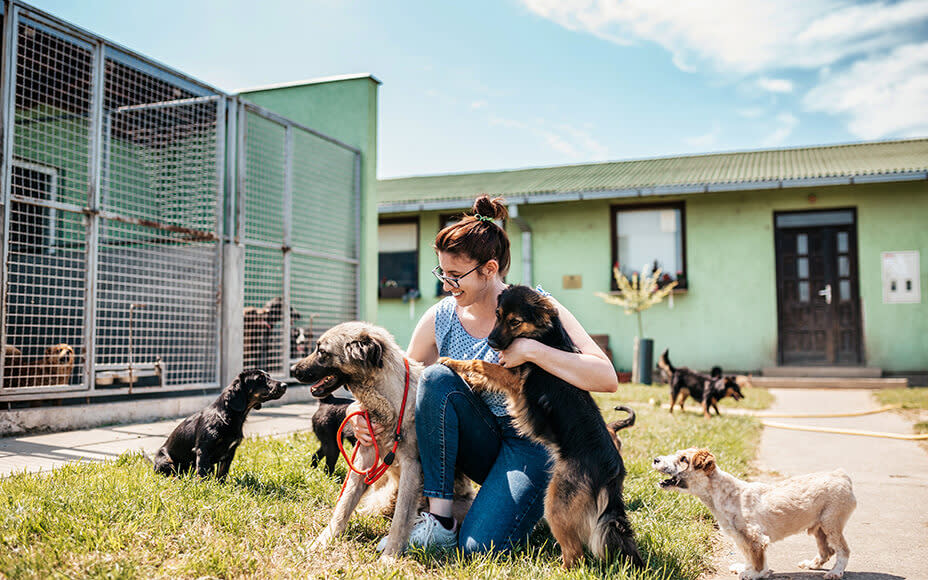Stress, restlessness, nervousness – is your dog a bundle of nerves? Learn to recognize the signs of stress and how to help your dog become more relaxed.
How Do Stress and Restlessness Manifest in Dogs?
Dogs have the fate of being four-legged creatures in a world of bipeds. Often, they must navigate and submit themselves unasked to our daily lives. The loud television, passing children, or a car ride to visit grandparents – perfectly normal and everyday things for us can be quite stressful for your dog.
Sometimes, the signs go unnoticed because the dog is trying hard not to lose its composure, displaying only subtle appeasement signals. That’s why it’s crucial to familiarize yourself with canine body language and closely observe and understand your four-legged friend.
Appeasement Signals in Dogs
Dogs usually communicate quite clearly with us. Often, we may not properly interpret certain appeasement signals. These are non-verbal behaviors through which our dogs communicate with each other and with us. After all, your furry friend can’t say, “Um… that child is a bit too close for comfort.” Instead, they may turn their head away or yawn, indicating that things are a bit overwhelming for them.

Initial signs of stress or nervousness in dogs include
- Tucked tail
- Turning the head away
- Yawning
- Frequent shaking
- Recurrent licking of the mouth
- Tension, stiffening, or restlessness
- Increased salivation
- Panting with lifted lips (looks like your dog is grinning)
If the initial signals are not perceived, and the stress-inducing factors are not reduced, or your dog is not comforted by you, nervousness escalates. In most cases, you may observe the following additional signs of stress in your dog:
- Unpleasant odor from the mouth or from the dog in general
- Trembling
- Crouched body posture
- Raising the neck and hind back hair (called hackles)
- Diarrhea
- Gnawing or licking paws
- Increased hair loss and/or dandruff
- Excessive, repetitive barking
- Whining, howling
- Destructive behavior
Note, however, that just like every person, every dog reacts differently to stress, and therefore, the signs can vary. Some dogs become highly active and bark, destroying things, while others suffer in silence, experience upset stomachs, or are constantly tired.

Physical Triggers for Restless Behavior in Dogs
If your dog shows signs of stress, it is advisable to seek veterinary advice. Hormonal changes, discomfort, and pain, just like in humans, can cause stress in our dogs, leading to behavioral changes. Your trusted veterinarian can thoroughly examine your pet and check if an illness or something else is bothering your dog.
Possible causes of physically induced stress could include:
- (upcoming) heat cycle (estrus)
- (excessive) sexual drive
- Cushing’s syndrome
- Epilepsy
- Itching, for example, due to an allergy
- Parasite infestation
- Infections such as a urinary tract infection
- Inflammations, such as pancreatitis
- Heart conditions like heart cough
- Tumorous diseases
If your dog shows acute stress symptoms such as heavy panting or trembling, you should immediately visit an emergency veterinary clinic. This could be an emergency due to poisoning, gastric torsion, or respiratory distress caused by, for example, ingesting a foreign object.
Psychological Causes of Stress in Dogs
Not always are stress factors tangible or diagnosable in the form of illnesses. If stress is psychologically induced, simple things like the vacuum cleaner, car rides, or the visit of unfamiliar people can trigger stress and restless behavior. Why, for example, bicycles or children cause stress in your dog can have various causes and should be discussed with dog trainers or behavior therapists.
Possible causes of psychological stress in dogs may include:
- Traumatic experiences
- Daily life stressors
- Inadequate socialization
- Overwhelm
- Fears
- Excess energy
Sometimes, the causes of stress are interrelated. For example, a dog from a shelter that was not properly socialized and exposed to environmental stimuli during puppyhood may be overwhelmed by everyday life in a city apartment. Therefore, it is crucial to work with professionals to address the root cause, alleviate your dog’s stress, and provide a relaxed life.

What Can I Do if My Dog is Very Stressed?
To help your dog in the long run so that it becomes more relaxed, it is crucial to identify the stress-inducing cause. If it’s an illness, appropriate treatment should be initiated. Once your furry friend is fully recovered, it should be able to relax again, and the stress should dissipate after a while. To make the treatment as pleasant as possible, you can hide tablets, for example, in tasty snacks such as our liver pâté. Visits to veterinarians can be concluded with a particularly tasty treat.


